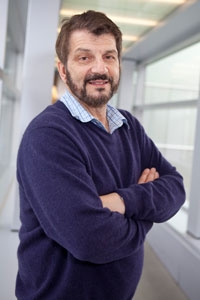David Weitz receives the 2024 Bower Award
Bower Award and Prize for Achievements in Science
By Carole H. Mezian
January 31, 2024
Harvard MRSEC researcher David A. Weitz is one of nine researchers that has been selected for the 2024 Bower Award and Prize for Achievements in Science by the prestigious The Franklin Institute Awards.
The Harvard MRSEC IRG II, where Professor Weitz focuses his research, develops new insights regarding the behavior of mechanically soft systems, which are subjected to perturbations far from equilibrium. By combining data-rich experiments, theory, and artificial intelligence, the research contributes greatly to Harnessing the Data Revolution NSF's Harnessing the Data Revolution (HDR) is a national-scale activity to enable new modes of data-driven discovery that will allow fundamental questions to be asked and answered at the frontiers of science and engineering. The HDR vision is realized through an interrelated set of activities and funding opportunities. Each of these efforts is designed to amplify the intrinsically multidisciplinary nature of the emerging field of data science. by expanding its application to soft materials.
NSF's Harnessing the Data Revolution (HDR) is a national-scale activity to enable new modes of data-driven discovery that will allow fundamental questions to be asked and answered at the frontiers of science and engineering. The HDR vision is realized through an interrelated set of activities and funding opportunities. Each of these efforts is designed to amplify the intrinsically multidisciplinary nature of the emerging field of data science. by expanding its application to soft materials.
Professor Weitz is the Mallinckrodt Professor of Physics and of Applied Physics at the Harvard John A. Paulson School of Engineering and Applied Sciences (SEAS). Research areas include Applied Physics, Bioengineering, and Materials and Mechanical Engineering.

David A. Weitz, Ph.D., Harvard University
Harvard's NSF-MRSEC IRG II: Non-Equilibrium Phenomena in Mechanically Soft Systems
Citation: For transforming our fundamental understanding of squishy materials ranging from gels, polymers, colloids, and emulsions to living organisms within his research group Experimental Soft Condensed Matter. His innovations led to the development of microdevices for applications ranging from rapid disease screening, drug screening, drug discovery, to cosmetic products. A master educator, he has popularized science through the physics of cooking, and in the soft matter community with the New England Complex Fluids.
"By discovering something new, and then realizing that not only is it new from a scientific point of view that it's going to change science, but if possible, it can also change technology." - Professor David WeitzFor transforming our fundamental understanding of squishy materials ranging from gels, polymers, colloids, and emulsions to living organisms. David A. Weitz's innovations led to the development of microdevices for applications ranging from rapid disease screening and drug discovery to cosmetic products. A master educator, he has popularized science through the physics of cooking. Dave Weitz, became a pioneer in the burgeoning new field of microfluidics with the NSF-MRSEC at Harvard University. Microfluidics involves the control and manipulation of tiny amounts of fluids at the micron scale. Since fluids behave quite differently at the microscopic scale, it's possible to design and construct devices that can exploit these properties for various purposes, including biomedicine and cosmetics. Among other medical applications, microfluidics technology is used in diagnostics (for example, COVID tests), cytology, targeted drug delivery, and genetic analysis, all using microscopic droplets of samples. Some of Weitz's contributions to the industry include methods of producing uniformly sized emulsion drops that improve consistency in manufacturing and methods of making double emulsions (drops within a drop) for the controlled release of fluids and medications.
In 2024, its remarkable 200th year, The Franklin Institute Awards is an American science and engineering award presented by the Franklin Institute, a science museum in Philadelphia founded in 1824. It pays tribute to our namesake and America's first citizen scientist and statesman, Benjamin Franklin, by honoring the greatest minds in science, engineering, and industry. The Franklin Institute is one of the oldest centers of science education and development in the United States.
Nine of the world's brightest visionaries—individuals whose work has transformed our lives and an early-career researcher who have raised the bar of scientific excellence. Through their boundless creativity and passion for discovery, they have seen the previously invisible, pushed the limits of nature's toolkit, and dreamed of solutions to global challenges—advancing health, sustainability, and human connection. The Bower Award and Prize for Achievement in Science was established by a $7.5 million bequest from Henry Bower in 1988, and medalists are selected by a Committee on Science and the Arts (CS&A), composed of local academics and professionals from the Philadelphia area.
To realize the significance of the Bower Award, some of the notable past laureates include: Nikola Tesla, Thomas Edison, Marie Curie, Max Planck, Albert Einstein, and Stephen Hawking. Some of the 21st century laureates of the institute awards include: Bill Gates, James P. Allison, Indra Nooyi, Jane Goodall, Elizabeth Blackburn, George Church, Robert S. Langer, and Alex Gorsky.
The nine laureates will be celebrated in Philadelphia during Awards Week, April 15-19, 2024. Honors will be bestowed during a ceremony at The Franklin Institute on Thursday, April 18, 2024.
Citations:
Franklin Institute, Wikipedia
Franklin Institute Awards, Wikipedia
